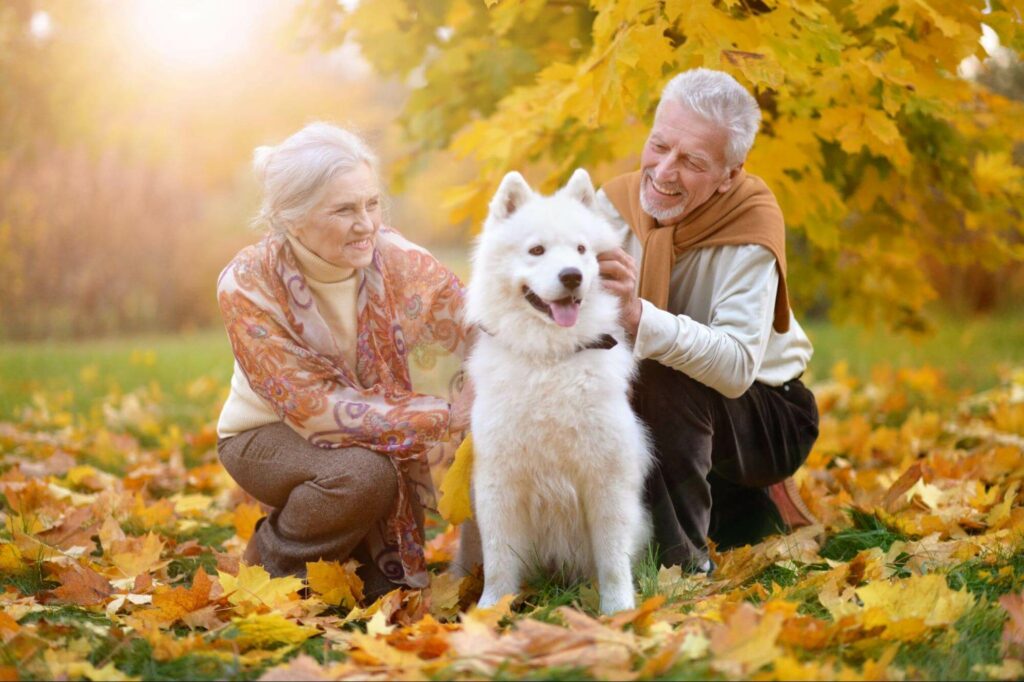By Josh Weiss-Roessler
Helping seniors cope with aging can mean taking care of their finances, medical care, and living arrangements. None of these responsibilities is easy, but one difficult decision rarely discussed is when it’s time to place an older person’s dog with someone who can provide better care. This can be a challenging conversation to have, but it’s essential if you notice that the dog is being neglected.
What Signs Should You Look For?
Weight Loss
If you notice that the dog keeps getting skinnier and skinnier, there’s a good chance that his aging dog parent forgets to feed him.
Generally speaking, dogs actually help to keep seniors on schedule. In fact, they can even help people suffering from dementia to improve their memory, but at a certain point, there’s little that a dog can do. And they shouldn’t suffer because their elderly caretaker can’t remember to give them food or water.
Going to the Bathroom Indoors
This one is so noticeable that you must be careful not to jump to conclusions if you visit a senior citizen’s residence and detect a problem.
The dog may suffer from some kind of issue, causing them to go inside the house. Before assuming the dog’s parent is the problem, get the dog to a vet and rule that out first.
Urinating and defecating indoors isn’t healthy for the dog or the senior, so if it’s happening because they are unable or unwilling to take the dog for walks, they probably can’t handle dog ownership anymore.
Frequent Escapes
Even a well-trained dog may run off from time to time when distracted by a million different things. You can minimize this tendency not only with training but by using something like fences and leashes.
But if a senior’s dog continually escapes their grasp or yard and has to be retrieved by neighbors, something needs to be done. Finding a new home may be the best solution if the problem can’t be solved.
An Overdose
One of the scariest things that can happen is that a senior’s dog will ingest large quantities of some of the human’s prescription medication.
At best, this will likely lead to the dog becoming seriously ill, but it could mean that its stomach will have to be pumped, and in some cases, it may even kill them.
This kind of accident can happen to anyone. Still, since seniors tend to have more medicine and be less coordinated, spills and accidents only become more likely the older they become. Keep an eye out for medication left out at the dog’s level.

Ways You Can Help
Help With Transportation
A great way to ensure that the dog is properly cared for is to take the dog to a vet. Many seniors lack the transportation to take their dog there, so you could offer a ride and speak to the vet about your concerns. They can help guide you to the right decision for the dog and its parent.
Outsource Help
If you identify issues, you may still be able to find ways for the dog to continue living with the senior. You can try to work out arrangements with family and friends to help with care or contact elder care agencies, and even attempt to educate the dog’s parent if there are things they can do to solve the issue.
A popular option is to hire a dog walker for daily walks and check-ins. You can use a service such as Rover to find a suitable match for your elder and their pet. A professional walker will come at the appointed time and day to walk and play with the pup. They can even administer medication if that’s part of their contract.
Find a New Home
But if you believe finding a new home for the dog is necessary, do your utmost to involve the senior in the decision. You can let them meet with potential owners, accompany the dog to her new home, and even visit a few times initially to help with the transition. You may consider boarding the dog until a permanent option is available.
Points a Senior Should Consider Before Adopting a Dog
Considering adopting a pet as a senior citizen? It’s a wonderful idea! Pets can provide companionship, love, and even health benefits. But before you adopt, there are a few things to consider. First, what kind of dog breed would be a good fit for your lifestyle?
If you’re very active, you’ll want a high-energy dog that can keep up with you on walks and hikes. A low-key breed like a pug or bulldog may be a better choice if you prefer a more relaxed lifestyle. Second, think about your physical activity level. Can you commit to walking your dog several times a day? Or would it be better to adopt an older dog that doesn’t require as much exercise? Finally, consider whether you’ve had pets in the past and how well you handled the responsibility.
Adopting a pet is a big commitment, but it can also be one of the most rewarding experiences of your life. So do some research, talk to your family and friends, and find the perfect furry friend for you.
Commonly Asked Questions About Seniors Having a Pet
What Are Some Positives to Senior Citizens Having a Dog?
Many senior citizens find companionship in their pets. Pets can provide love, comfort, and a sense of security for older adults who live alone. Having a pet also gives seniors someone to take care of, which can help boost their self-esteem and add purpose to their lives. These benefits can make seniors happier, healthier, and more active overall.
What Are My Options for Re-Homing a Dog I Can No Longer Care For?
As people age, their needs and circumstances often change. This can mean saying goodbye to a beloved pet for many older people. While this can be a difficult decision, it is essential to consider all of the re-homing options available. Friends and family members may be willing to take in a pet, and several adoption and rescue shelters specialize in finding homes for older animals. No matter what option is chosen, the most important thing is to ensure that the pet will have a loving home.
Can you think of other ways someone can help a senior who can no longer care for their dog? Share it with us in the comments.











